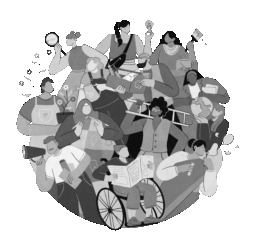How collaboration with K4DD is supporting FCDO staff
Exploring research ideas, problems and needs collaboratively is a valuable part of synthesising evidence, and also an opportunity to draw on the expertise of others.
This is a unique feature of the Knowledge for Development and Diplomacy (K4DD) programme, which provides the UK’s Foreign, Commonwealth and Development Office (FCDO) with a high-quality and rapid evidence and learning service. It provides FCDO staff with the opportunity to explore their needs with researchers and take advantage of a research helpdesk for rapid evidence reviews, larger (more detailed) reports, and a bespoke learning service.
In this blog, William Avis and Phoebe Hill share their experiences of engaging through K4DD, and how the programme is supporting the day-to-day work in FCDO.
How collaboration with K4DD supports FCDO staff
Phoebe Hill works in the Scholarships, Tertiary Education and Partnerships (STEP) Department of FCDO. She has been working with K4DD since late 2023 on three linked requests. Her latest request was for a rapid evidence review of the role women’s participation in higher education and technical and vocational education and training (TVET) plays in the economic and social development of lower- and middle-income countries.
The STEP Department was looking for the most up-to-date evidence, and their staff were keen to draw on available, free-to-use resources, to support our work.
“K4DD represented an exciting opportunity to engage with researchers based in a leading academic institution (in this instance the University of Birmingham) with extensive experience of supporting FCDO through the provision of rapid evidence reviews.
The partnership with William provided an opportunity to outline our research needs and how these feed into our programming. It also provided an opportunity to develop a clear and appropriate research question, defining the scope of evidence required, and clarifying expectations.
The discussion allowed us to test our internal thinking and assumptions with a representative of academia in a safe and constructive environment. It also allowed us to define the scope of the work to be undertaken in a manner that was useful to our day-to-day work”.
This discussion led to the submission of three queries on the following issues:
- Women’s Participation Rates in Higher Education (HE) and TVET: Collating data on women’s participation rates in HE and TVET, alongside indicators of socio-economic development.
- Women’s Participation in TVET and Socio-Economic Development: Providing a synthesis of existing literature on vocational training programmes in the global south and evidence of variation of impacts.
- Women’s Participation in HE and Socio-Economic Development: Providing a synthesis of existing literature on vocational training programmes in the global south and evidence of variation of impacts.
As well as being uploaded to K4DD’s OpenDocs repository for public access, the reports have also been uploaded to FCDO’s internal Centre of Expertise for Education so that numerous teams and posts can benefit from the learning.
How K4DD research supports learning
William Avis is a K4DD Researcher based at the University of Birmingham’s Governance and Social Development Resource Centre (GSDRC), which has extensive experience working with FCDO on rapid evidence reviews.
“The queries submitted by Phoebe dovetailed with my research interests in gender equality and its role in the achievement of sustainable development. The research queries allowed an exploration of factors that shape women’s participation in higher education and TVET, including access to quality education, economic resources, political participation, employment, leadership, and decision-making at all levels.
Discussions with Phoebe and the STEP Department highlighted that increasing economic opportunities and productivity, while supporting sustainable economic transformation, is considered to be among the most pressing global challenges. Education and training systems, including TVET, were identified as one means to help equip current and future workforces with the skills they need for productive jobs and entrepreneurship”.
The research process highlighted that across the education system at all levels, women and girls are the first to be denied the right to education despite progress made over past decades.
Specifically, reports outlined that TVET systems can be gender-biased, affecting the selection of access to and participation in specific learning programmes or occupations for both men and women. In turn, this gender division of labour contributes to the perpetuation of gender inequalities at work and in society at large and has long-running impacts on socio-economic development.
The benefits of working with K4DD
The K4DD helpdesk service is able to support FCDO colleagues in a flexible and adaptable manner by drawing on the expertise and experiences of skilled and knowledgeable researchers. The team has developed a close-knit, researcher-driven organisational culture that is focused on meeting the needs of users. Phoebe and William reflect that:
“The experience of working collaboratively, constructively, and flexibly, with an emphasis placed on clear, open, collegial communication at all stages of work was fundamental to the success of the research commissions. It allowed the development of a Rapid Evidence Review that supported the use of evidence by the STEPs team in a manner that minimised administrative barriers to the use of the service”
